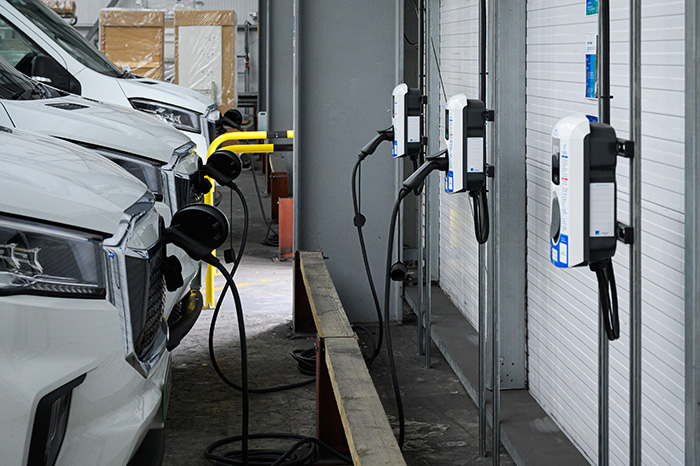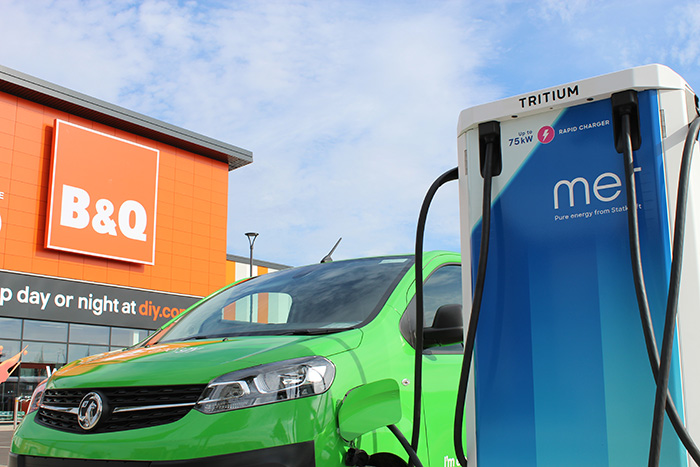Electric Vehicle Charging: EVerybody’s Talking About 2023

After an action-packed year at Mer, we waved goodbye to 2022 as a transformed organisation. We signed up lots of new commercial and local authority clients the length and breadth of the country, we entered into new partnerships from Allstar to Zap-Map, and we’ve teamed up with multiple companies to provide workplace and fleet charging. But perhaps our major news story was the acquisition in April of Elmtronics, a North-East based company offering fleet and workplace charging solutions. As a result, we welcomed 70+ new colleagues into the Mer family.
Some of Mer’s new and existing colleagues share their highlights of 2022, and what they see in Mer’s future for 2023 and beyond…
Customer-Centric Approach
Alex Hinchliffe, Director of Public Charging highlights why it’s been a very interesting year at Mer, “The key fundamental is that we’ve grown from 10 to 110 people through the acquisition of Elmtronics. This massive growth did involve some growing pains, but the biggest success story has been building the foundations for future success in terms of our scalability and future-proofing the work we do.
“We’ve seen significant growth in terms of our customers, having signed some really big names. In terms of public charging, as the EV market grows and EV charging demand grows with it, we made a strategic decision to move toward ultra-rapid charging as a result of our focus on improving the overall user experience. This involves another level of due diligence and grid investigation. Which is why our customer-centric approach as a consultative partner is proving so valuable to customers.
“As for 2023, it’s such a fast-moving industry you’ve got to expect the unexpected. To do that, you have to be resilient and agile, which is how we have structured the company. We have to be able to deal with everything that is thrown at us. That can be in terms of government policy, technology changes and environmental concerns. I think 2023 will see the greatest scrutiny around sustainability, especially Scope 3. We’ll be looking at our suppliers’ and contractors’ sustainability credentials because, ultimately, our customers want to work with a truly sustainable partner, like Mer.
“Economically, the elephant in the room, of course, is the cost of power. That is going to be a major factor this year. Organisations and businesses are probably going to see a shift to smart grid technology where they can control energy pricing with their own renewable generation on-site. No one company has all the answers, so collaboration is key. A fully-rounded value chain around smart grid technology, solar power, software, EVs, supplier emissions, etc. needs the industry to pull together for the greater good of the transition and, essentially, to save the planet.”
Network Infrastructure

Natasha Fry, Head of Strategic Accounts explains how Mer is helping businesses transition, “We’re in a great place to help businesses that are just dipping their toes in electrifying their fleets. A lot of organisations haven’t started or aren’t progressing at the rate they expect to transition their diesel fleet over to EV. So, we’ve been helping them with their initial phases and I think this is going to go off the scale in 2023.
“One of the biggest challenges is the power constraints in certain locations. Organisations will need to face this for fleet and workplace charging, but it’s not just the power that is the issue, it’s the processes that businesses and distribution network operators (DNOs) need to go through to upgrade supply and bring in new connections. It’s complex and involves so many variables, and for most people it’s a real step into the unknown. That’s where I am excited to be making the difference for companies of all sizes by helping them engage in these conversations. With the backing of Statkraft, Mer can build those trusted relationships and work with companies through the transition by being at their side every step of the way.”
People Power
Naomi Nye, Head of National Sales shares why she decided to change roles last year, “Joining Mer was a big highlight for me. Part of the appeal is the people-centric ethos. Everybody I speak to, at every level, share the same enthusiasm and passion to work together and get things done. This plays out in every conversation I have with colleagues and customers. Everybody is very passionate about sustainability and how we can achieve our goals without losing the people-friendly ethos. As head of sales, I’m delighted that the way we work with customers is not about selling, it’s about supporting, consulting and guiding – which sits very well with me.
“There are a number of things the EV industry needs to address in 2023, it’s exciting and challenging because there are so many different stakeholders involved. They may be working towards the same goal but they each have different priorities. There’s the energy-side and power requirements, making sure the infrastructure is in place, accessible and is future proof and flexible, there’s the EVs themselves, and supply-side challenges, and there’s government steering which seems to be backfilling holes with different regulations. It's a bit like the rollout of ATMs or broadband – it seems simple enough until practicalities hit, and you need to go back and rethink a bit. Working with MER is where we can address all of these considerations for our customers up front.”
Smarter Communications
Stephanie Salguero, Head of Marketing and Sustainability Manager reflects on a busy 2022 and stresses the importance of translating complex regulations clearly for customers, “There was a great deal of marketing activity for Mer last year. After launching Mer in 2021, we developed our brand awareness and announced lots of new customer and success stories to the press. We also created a new marketing and customer service strategy to align with Mer’s commitment to a customer-centric approach. For me personally, some of the highlights were setting out our sustainability strategy in the UK and expanding the marketing team to create more informative content to help support our customers and the broader EV market.
“I think that the smart charging regulations will be a feature of 2023. There is still a lot that customers don’t understand. It will be down to companies like Mer and other charge point operators to make sure the communication is consistent, and the communications channels are in place to piece the puzzle together for customers in the easiest possible way. Our role is to take people through the process, talk to them about these different elements and make sure that everything we do gives them as much choice as possible.”
Integrated Future

Giles Benbow, Senior Manager Business and Partnerships Development: “Mer has evolved from an amalgam of start-ups and scale-ups into a well-structured organisation with a forward-looking mentality. This touches on all areas of the business, from product development and procurement through to sales and business development, and the formation of a new team to focus on developing business and partnerships at a group‑level.
“My role very much has an eye on the future and what is making me excited is the market opportunities and the challenges that need to be addressed. The size and scale of the projects coming along in 2023 and beyond are huge.
“How businesses handle the transition of their commercial fleets is going to be a major challenge and opportunity. There are around 4.3 million light commercial vehicles in the UK, and about 25,000, medium commercial vehicles, and close to 100,000, heavy commercial vehicles. All of that market is potentially in transition. By 2030, there's going to be millions of vehicles in the commercial sector. Commercial vehicles have a predictable lifecycle. They get replaced every six or seven years and have a fundamental impact on the bottom line of the company. Depot charging – the back-to-base charging requirements of fleets – requires tens of megawatts of power, plus a lot of engineering work to access grid connections, etc. So, if we can help an organisation improve the total cost of ownership, and how they manage those vehicles, the arguments against electrification evaporate.
“We see a massive acceleration on the horizon of EV adoption in fleet. On top of this, we need conversations about energy security and integrating solar energy and battery storage into the solutions. The next few years are going to be fascinating and transformative.”
Driving Forward
And final thoughts are from Mer’s Managing Director, Karl Anders who was appointed in August 2022. “When a company goes through an astonishing period of growth like Mer experienced in 2022 you might expect things to become a bit disjointed. Fortunately, it takes more than a massive acquisition and integration of new businesses to throw the Mer family off-track. Our commitment to customer service has never been stronger and is matched by our commitment to supporting each other. I’m proud to have become a part of such a dynamic company.
“In 2023 we will continue to combine state-of-the-art electric vehicle charging with clean energy from our parent company Statkraft in Norway, as an exciting way to contribute to the green economy and help fight climate change. As I’ve said previously, we are in the right place at the right time and our time to make an impact is NOW.”
To find out more about Mer EV charging solutions visit uk.mer.eco
or download our comprehensive EV charging guide.
Click the article to enlarge it.


























































